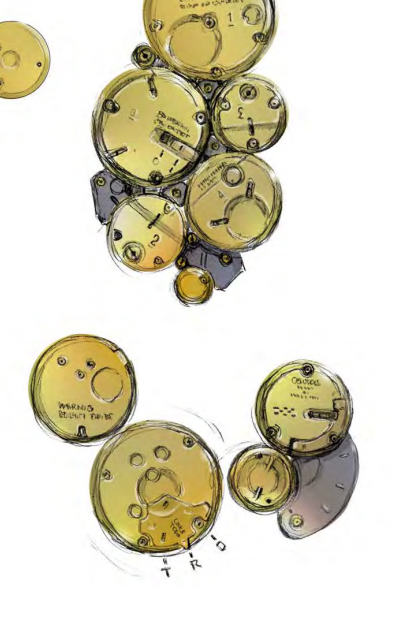Kojima Productions' Ludens mascot began as a ballet dancer, ended up as an Alan Turing tribute
Turn off the PC now Snake.

Today marks the fifth anniversary of Kojima Productions, the studio founded by Hideo Kojima following his acrimonious exit from Konami, and to mark the occasion there were a few minor treats for fans. No, there was nothing about the studio's next game.
As well as an anniversary wallpaper there's a short Q&A with Yoji Shinkawa, the artist behind both the Metal Gear Solid series and Death Stranding. The document focuses on the design of the studio's mascot, the all-caps astronaut LUDENS, and goes into considerable detail on the various influences that Kojima wished to be represented in the final design.
"When we first started to create the company's logo, Mr. Kojima brought up the idea of a ballet dancer jumping," says Shinkawa. "As ballet is a 'comprehensive art', he said he wanted to achieve that digitally. But I had a hard time digesting this idea. So, one of the ideas that I proposed was a mixture of an astronaut suit and a knight from a digital world, something that Mr. Kojiima had suggested in the past. Then, he added the idea of the Turing machines and the flag to this. By the end, the concept of the ballet dancer was completely gone [laughs]."
It's sad this never happened, mainly because the internet's reaction to Kojima Productions' new logo being a ballet dancer would have been something to behold.
The 'knight' design led to Shinkawa initially wondering about whether the character should have a sword, something shown in the concept art accompanying the Q&A. It's interesting to note that at this stage the mascot much more resembles a Metal Gear design to my eyes: the final design bulks-out the suit's proportions and moves away from 'soft' elements like the helmet plume towards a more hard-edged and machined feel.

"There were elements of a knight already, so I considered giving LUDENS a sword to match," explains Shinkawa. "But Mr. Kojima said 'we're not going to be fighting, so I don't want them to carry a sword or a gun but something else.' That's where the idea for the flag came from.
"I think his idea was to explore the digital world and plant a flag on its frontiers, while hinting back to the first moon landing in human history. I'm sure there must have been some inspiration taken from that."
Keep up to date with the most important stories and the best deals, as picked by the PC Gamer team.
Finally Shinkawa discusses the spinning gold discs that adorn the suit and equipment of LUDENS, which it turns out are a tribute to Alan Turing, the British genius widely considered the father of modern computer science.
"This was a request from Mr Kojima. He wanted to have elements resembling Turing machines in the logo; to have calculator-like parts in LUDENS. Turing machines were invented by British mathematician Alan Turing, and they became the base of modern-day computers. The golden disks on LUDENS' body are a play on this concept. So, the idea was for the suit to have calculators that would have a role similar to that of Turing machines. They search and measure various things as they spin."
Here's the detail of the disks.

The final pieces of the anniversary announcement were two short videos, one showing Kojima's BAFTA lifetime achievement award being couriered to him Bridges-style, and the other a neat 'thank you' video to the studio's fans. The below ends with a pan out into hundreds of individual shots. Yes there probably is a cryptic clue in one of those panels, that would be Kojima's style, but I've been squinting at it for ten minutes, and have to surrender.

Rich is a games journalist with 15 years' experience, beginning his career on Edge magazine before working for a wide range of outlets, including Ars Technica, Eurogamer, GamesRadar+, Gamespot, the Guardian, IGN, the New Statesman, Polygon, and Vice. He was the editor of Kotaku UK, the UK arm of Kotaku, for three years before joining PC Gamer. He is the author of a Brief History of Video Games, a full history of the medium, which the Midwest Book Review described as "[a] must-read for serious minded game historians and curious video game connoisseurs alike."

